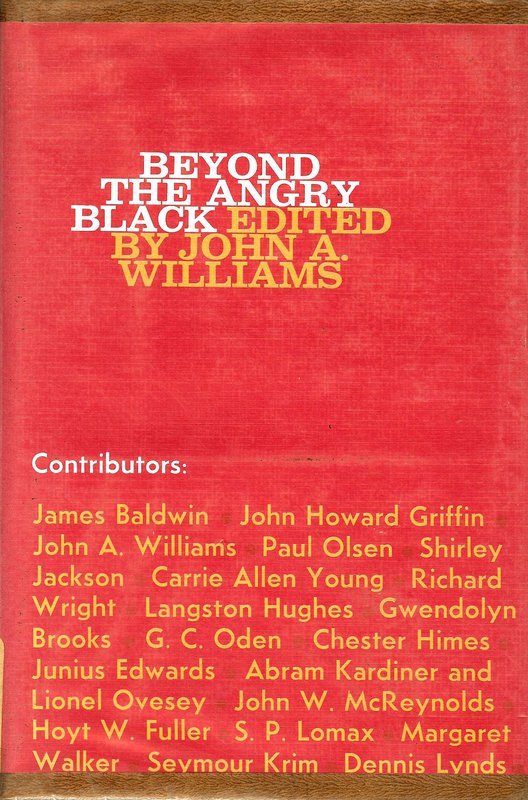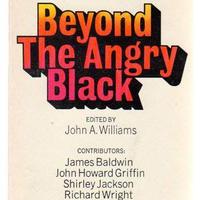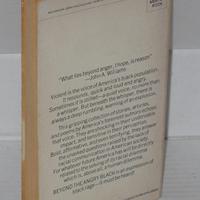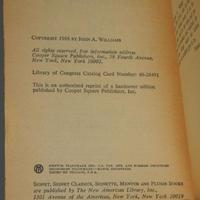-
Title
-
Beyond the Angry Black
-
This edition
-
"Beyond the Angry Black" . Ed. John A. Williams. New York: Cooper Square, 1966. xix+198 pp.; repr. with new postscript. New York: Cooper Square, 1969. 198 pp.
-
Other editions, reprints, and translations
-
• Repr. New York: Mentor/New American Library, 1971. xix+198 pp.
-
Table of contents
-
Contents (1966 ed.):
Theatre : the negro in and out of it / James Baldwin -- Medger Evers / Gwendolyn Brooks -- Mother dear and daddy / Junius Edwards -- The apostle / Hoyt W. Fuller -- Dark journey / John Howard Griffin -- Dilemma of the negro novelist in the United States / Chester Himes -- Name in print / Langston Hughes -- Flower garden / Shirley Jackson -- Psychodynamic inventory of the negro personality / Abram Kardiner and Lionel Ovesey -- Ask for a white cadillac / Seymour Krim -- Pollution / S.P. Lomax -- A night in Syracuse / Dennis Lynds -- Memo to the current madness / John W. McReynolds -- Man white, brown girl and all that jazz / G.C. Oden -- Line of duty / Paul Olsen -- Now / Margaret Walker -- Navy black / John A. Williams -- The plea / Richard Wright -- Adjö means goodbye / Carrie Allen Young.
Contents (1969 ed.):
Theatre : the negro in and out of it / James Baldwin -- Medgar Evers / Gwendolyn Brooks -- Mother dear and daddy / Junius Edwards -- the apostle / Hoyt W. Fuller -- Dark journey / John Howard Griffin -- Dilemma of the negro novelist in the United States / Chester Himes -- Name in print / Langston Hughes -- Flower garden / Shirley Jackson -- Psychodynamic inventory of the negro personality / Abram Kardiner and Lionel Ovesey -- Ask for a white Cadillac / Seymour Krim -- Pollution / Lomax, S.P. -- a night in Syracuse / Dennis Lynds -- Memo to the current madness / John W. McReynolds -- Man white, brown girl and all that jazz / G.C. Oden -- Line of duty / Paul Olsen -- Now / Margaret Walker -- Navy black / John A. Williams -- the plea / Richard Wright -- Adjo means goodbye / Carrie Allen Young -- a postscript concerning the times.
-
Reviews and notices of anthology
-
• Fuller, Hoyt W. "'Mightier Than the Sword': Three New Anthologies of Negro Writing." [Rev. of "American Negro Short Stories", ed. Clarke (1966); "The Best of Negro Short Stories" ["sic", actually "Best Short Stories by Negro Writers"], ed. Hughes (1967); and "Beyond the Angry Black", ed. Williams (1966; repr. with new postscript, 1969)] "Negro Digest" (Oct. 1966): 43-47. [Google Books preview https://books.google.com/books?id=0zkDAAAAMBAJ&lpg=PA44&dq=%22american%20negro%20short%20stories%22%20clarke&pg=PA43#v=onepage&q&f=false ]
"The John A. Williams anthology . . . is not precisely an anthology of short stories, and not all its contributors are Negroes, but the emphasis is on short fiction. . . . White contributors to the Williams anthology are John Howard Griffin, the late Shirley Jackson, Abram Kardiner and Lionel Oversey, Seymour Krim, Dennis Lynds, John W. McReynolds and Paul Olsen" (46).
"Taken together, the stories and articles and poems in [the three anthologies under review] tell more about the history of Negroes in America—and of their relationshp with whites—than shelves of volumes of history and sociology" (47).
• Randall, Dudley. Rev. of "Beyond the Angry Black", ed. Williams. "Negro Digest" (Sept. 1967): 93-94. [Google Books preview https://books.google.com/books?id=EToDAAAAMBAJ&lpg=PA94&dq=%22american%20negro%20short%20stories%22%20clarke&pg=PA93#v=onepage&q&f=false ]
This volume contains short stories, poetry, and articles, "like Herbert Hill's mélange, "Soon One Morning" but . . . it differs because it includes both black and white writers, and supposedly has one theme, black anger" (93).
Randall summarizes various items from this anthology, including Kardiner and Ovesey's "Psycho-dynamic Inventory of the Negro Personality," adding parenthetical remarks that seem to suggest that he endorses their analysis: Kardiner and Ovesey's essay "describes both the lower and middle and upper class Negro as suffering from self-hatred, which he projects onto other Negroes. The lower-class Negro hates whites, but fears to express his hate, so turns it inward upon himself and onto other Negroes. The street corners and candy stores are scenes of vicious, derogatory gossip. Because the mother is often head and breadwinner of the family, he is confused about his sexual role. His meager family life gives him little opportunity to learn affection and confidence in others. Even though he tries to effect relationships with others by becoming a joiner, he squabbles and tries to dominate his organizations. (One sees examples of this divisiveness in so-called Negro leaders who criticize other leaders instead of helping them.) Upper-class Negroes have a more secure family life, but have intense conflicts about status. They want to be white, and since that's impossible, they hate themselves and // everything black. (Many, for instance, take pride in not reading Negro newspapers or magazines)" (93-94).
"Mr. Williams warns that whites have never shown reason in relation to race, and blacks, tired of having their reasonableness mistaken for weakness, are about to give it up. He pleads for a step beyond anger, for reason before there is a holocaust, and includes Richard Wright's prophetic 'Plea' from "Native Son", which, published in 1940, is still pertinent today. Unfortunately, he will not be heeded" (94).
-
Commentary on anthology
-
• "A reissue with new material of The Angry Black, published in 1962" (WorldCat)
-
See also
-
• "The Angry Black". Ed. John A. Williams (1962) [see above]
• "Soon, One Morning" (1963) and "Anger, and Beyond" (1966), both ed. Herbert Hill: see above.
-
Cited in
-
• Kinnamon 1997: 478.
-
Item Number
-
A0071







